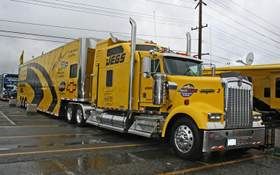1st Deaf Woman In Wisconsin, And Just The 5th In The Country, Receives Her CDL.
Topic 16486 | Page 1
Wow that's really neat!

So that's great and all, but...
Regardless of how "heightened" her other senses may be, I don't really see how they can fully compensate for a lack of hearing. Am I the only one who realizes this?
Some scenarios to consider:
The engine or the transmission starts making a whining or grinding noise, signaling impending failure. How would she know about it before it was too late?
Cars passing her on the highway honk their horns at her to let her know she is dragging a pedestrian on her trailer bumper. She can't hear any of them. Or the pedestrian's screams.
A tire blows out and she thinks she just hit a bump because she didn't hear the pop.
These are just the first three examples I came up with off the top of my head. I'm sure there are better ones.
There are a million different ways hearing plays an important role in this job, and I just don't see how this can be considered safe.

I wasn't going to say anything because I figured it would be taken as rude and insensitive, but, I agree with you.
I think the DOT regulation prohibits drivers from wearing full headphones or ear buds, anything that blocks your hearing because you wouldn't be able to hear a siren or a train horn. Wouldn't this be the same thing?
DOT:
Department Of Transportation
A department of the federal executive branch responsible for the national highways and for railroad and airline safety. It also manages Amtrak, the national railroad system, and the Coast Guard.
State and Federal DOT Officers are responsible for commercial vehicle enforcement. "The truck police" you could call them.
So that's great and all, but...
Regardless of how "heightened" her other senses may be, I don't really see how they can fully compensate for a lack of hearing. Am I the only one who realizes this?
Some scenarios to consider:
The engine or the transmission starts making a whining or grinding noise, signaling impending failure. How would she know about it before it was too late?
Cars passing her on the highway honk their horns at her to let her know she is dragging a pedestrian on her trailer bumper. She can't hear any of them. Or the pedestrian's screams.
A tire blows out and she thinks she just hit a bump because she didn't hear the pop.
These are just the first three examples I came up with off the top of my head. I'm sure there are better ones.
There are a million different ways hearing plays an important role in this job, and I just don't see how this can be considered safe.
Of course I don't think it's safe. It's one thing in a car, another in a truck where you can't turn your head and see every angle of your vehicle. One of our members just posted about running over a tree in a Walmart parking lot. Ok, they did a little property damage. It seems most of us rookies, including myself, have hit something at one point or another. And we can hear. How much worse would it be if we couldn't? I think the number one concern is backing. I always open my windows and turn off the radio when I'm backing so I can hear people honking or yelling. But she is going to be teaming, so maybe her husband will spot her.
Actually, my first thought when I read this was that I feel sorry for the crap she may have to deal with out here. I doubt many shippers and receivers will suddenly lighten up and be super polite because she can't hear. And God forbid she ever gets in a serious or fatal accident, even if she's not at fault. She'll be on the front page--"Deaf Trucker Involved in Fatal Accident."
Shipper:
The customer who is shipping the freight. This is where the driver will pick up a load and then deliver it to the receiver or consignee.

The Agency's decision on these exemption applications is based on the current medical literature and information and the “Executive Summary on Hearing, Vestibular Function and Commercial Motor Driving Safety,” (the 2008 Evidence Report) presented to FMCSA on August 26, 2008.
The evidence report reached two conclusions regarding the matter of hearing loss and CMV driver safety:
(1) No studies that examined the relationship between hearing loss and crash risk exclusively among CMV drivers were identified.
(2) evidence from studies of the private driver license holder population does not support the contention that individuals with hearing impairment are at an increased risk for a crash.
In addition, the Agency reviewed the applicant's driving record found in the CDLIS , for CDL holders, and interstate and intrastate inspections recorded in MCMIS. The Agency acknowledges there could be potential consequences of a driver being hearing impaired and/or deaf while operating a CMV under some scenarios. However, the Agency believes the drivers covered by the exemptions do not pose a risk to public safety.
CDL:
Commercial Driver's License (CDL)
A CDL is required to drive any of the following vehicles:
- Any combination of vehicles with a gross combined weight rating (GCWR) of 26,001 or more pounds, providing the gross vehicle weight rating (GVWR) of the vehicle being towed is in excess of 10,000 pounds.
- Any single vehicle with a GVWR of 26,001 or more pounds, or any such vehicle towing another not in excess of 10,000 pounds.
- Any vehicle, regardless of size, designed to transport 16 or more persons, including the driver.
- Any vehicle required by federal regulations to be placarded while transporting hazardous materials.
CSA:
Compliance, Safety, Accountability (CSA)
The CSA is a Federal Motor Carrier Safety Administration (FMCSA) initiative to improve large truck and bus safety and ultimately reduce crashes, injuries, and fatalities that are related to commercial motor vehicle
FMCSA:
Federal Motor Carrier Safety Administration
The FMCSA was established within the Department of Transportation on January 1, 2000. Their primary mission is to prevent commercial motor vehicle-related fatalities and injuries.
What Does The FMCSA Do?
- Commercial Drivers' Licenses
- Data and Analysis
- Regulatory Compliance and Enforcement
- Research and Technology
- Safety Assistance
- Support and Information Sharing
CMV:
Commercial Motor Vehicle
A CMV is a vehicle that is used as part of a business, is involved in interstate commerce, and may fit any of these descriptions:
- Weighs 10,001 pounds or more
- Has a gross vehicle weight rating or gross combination weight rating of 10,001 pounds or more
- Is designed or used to transport 16 or more passengers (including the driver) not for compensation
- Is designed or used to transport 9 or more passengers (including the driver) for compensation
- Is transporting hazardous materials in a quantity requiring placards
Interstate:
Commercial trade, business, movement of goods or money, or transportation from one state to another, regulated by the Federal Department Of Transportation (DOT).
Intrastate:
The act of purchasers and sellers transacting business while keeping all transactions in a single state, without crossing state lines to do so.
Fm:
Dispatcher, Fleet Manager, Driver Manager
The primary person a driver communicates with at his/her company. A dispatcher can play many roles, depending on the company's structure. Dispatchers may assign freight, file requests for home time, relay messages between the driver and management, inform customer service of any delays, change appointment times, and report information to the load planners.CDLIS:
The Commercial Driver’s License Information System (CDLIS) is a nationwide computer system that enables state driver licensing agencies (SDLAs) to ensure that each commercial driver has only one driver’s license and one complete driver record.
A drivers file will include their driving record as well as their medical certification status.
New Reply:
New! Check out our help videos for a better understanding of our forum features

















Preview:
This topic has the following tags:
Becoming A Truck Driver CDL Qualifications DOT Physical Exemptions Health Concerns Medical Certification







 TT On Facebook
TT On Facebook
Trucker becomes first deaf woman to receive commercial driving license in Wisconsin
She says being the first deaf woman to receive a commercial driver’s license in Wisconsin and just the 5th in the country carries a strong message.
“Don’t let people ruin your dreams. If you want to do it, you can do it,” said Helgerson.